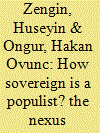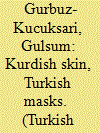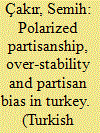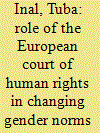|
|
|
Sort Order |
|
|
|
Items / Page
|
|
|
|
|
|
|
| Srl | Item |
| 1 |
ID:
173199


|
|
|
|
|
| Summary/Abstract |
This article investigates the effects of populist discourse on leadership and state behavior at the international level. From 2002 to 2013, Turkey’s Justice and Development Party (AKP) gradually consolidated its power, largely by deploying populist discourses and actions. However, after the party faced a number of challenges, including the Gezi protests, corruption allegations, and a failed coup, its populist rhetoric did not only begin to weaken but also seems to have created a problem of path dependency, which limited the decision-making capability at the hands of its leadership. By comparing the 2001–2002 and 2018–2019 economic crises based on the most-likely case research design, we assert that the AKP’s discursive turn into anti-Western and anti-establishment politics pushed the party into a corner, making it less likely to collaborate with international organizations, such as the IMF and even private consulting companies despite the country’s high inflation rates and currency depreciation.
|
|
|
|
|
|
|
|
|
|
|
|
|
|
|
|
| 2 |
ID:
173200


|
|
|
|
|
| Summary/Abstract |
Evdirrehîm Hekarî is mostly known for his Kurdish nationalist writings and activism at the end of the Ottoman Empire. He continued to be a voice for the Kurdish nation during the Republican period in his private writings, while he identified as a Muslim Turk in his publications. Hekarî’s complete rejection of secular Turkishness existed alongside his submission to Turkish Islamic discourse. His split identity and paradoxes are analyzed using Frantz Fanon’s study of the colonized man and his inconsistencies in his fight with the colonizer. In examining Hekarî’s inner inconsistencies, the article also benefits from Partha Chatterjee’s study of the contradictions of nationalist thought in its battle with colonialist power.
|
|
|
|
|
|
|
|
|
|
|
|
|
|
|
|
| 3 |
ID:
173198


|
|
|
|
|
| Summary/Abstract |
This article investigates the trajectories of conflicting narratives that describe religion-state relations in Turkey. It explores the main tenets of the secular-religious polarization perspective (SRPP) that has been dominant until recently. It argues that while the SRPP is losing its hegemony in the field of academia, it has enduring power in the political field. The paper also contributes to the literature by discussing the ways in which the SRPP has been instrumentalized for political purposes in both domestic and international contexts by hegemonic political powers, including the ruling party, the AKP, in Turkey.
|
|
|
|
|
|
|
|
|
|
|
|
|
|
|
|
| 4 |
ID:
173196


|
|
|
|
|
| Summary/Abstract |
A vast literature demonstrates that partisanship has a stabilizing impact on politics, as it limits electoral volatility. Recent studies have also shown that polarization increases partisanship, thus contributing to electoral stability. Focusing on Turkey, an unconsolidated and highly polarized democracy, this study investigates the role of partisanship in a comparative context by means of data from the Comparative Study of Electoral Systems project. I find that Turkey (among more than 40 countries) is a very high-partisanship country, where partisanship greatly shapes the evaluations of short-term determinants of vote and the vote itself. This research also shows that partisanship in Turkey is associated with very low electoral volatility and defection rates. Moreover, the degree of identification also plays a significant role in its impact on volatility and defection. These findings from the Turkish case offer insights and stimulate a new normative debate on the role of partisanship in unconsolidated democracies.
|
|
|
|
|
|
|
|
|
|
|
|
|
|
|
|
| 5 |
ID:
173197


|
|
|
|
|
| Summary/Abstract |
The diffusion of international human rights norms through the enforcement of international human rights law by courts has been explored by both scholars of international relations and international law. Turkey, which has been a state party to most international human rights treaties despite being a major violator of human rights, is the case in this paper. It examines norm diffusion in the area of women’s rights through court action in a patriarchal culture protected and represented by a deeply patriarchal state and judiciary. By looking at the legal processes, domestic and international, through which the issue of the right of Turkish women to keep their maiden names after marriage has gone, this paper argues that norm diffusion through court action can be triggered even in difficult cases such as changing gendered norms and describes the conditions and mechanisms that make these changes more likely.
|
|
|
|
|
|
|
|
|
|
|
|
|
|
|
|
| 6 |
ID:
173201


|
|
|
|
|
| Summary/Abstract |
We verify the potential impact of credit-enhanced monetary policy rule on inflation, GDP and credit dynamics in Turkey (2002Q1—2018Q3), where the Turkish Cental Bank takes into account financial stability in its inflation-targeting strategy. We estimate interest rates from two monetary policy rules (classic and augmented with the exogenous credit-to-GDP gap) with time-varying parameters (TVP) and assess their performance in a TVP-VAR model. The results show that after the global crisis both observed interest rates and those estimated from the Taylor-rule impact inflation and the GDP in a similar way. The central bank’s monetary policy after 2010 was in line with the Taylor rule and took into account cyclical systemic risk with increased strength in the monetary transmission mechanism. Yet, before the crisis, both types of Taylor rules indicate that the bank’s monetary policy should have been more restrictive.
|
|
|
|
|
|
|
|
|
|
|
|
|
|
|
|
|
|
|
|
|